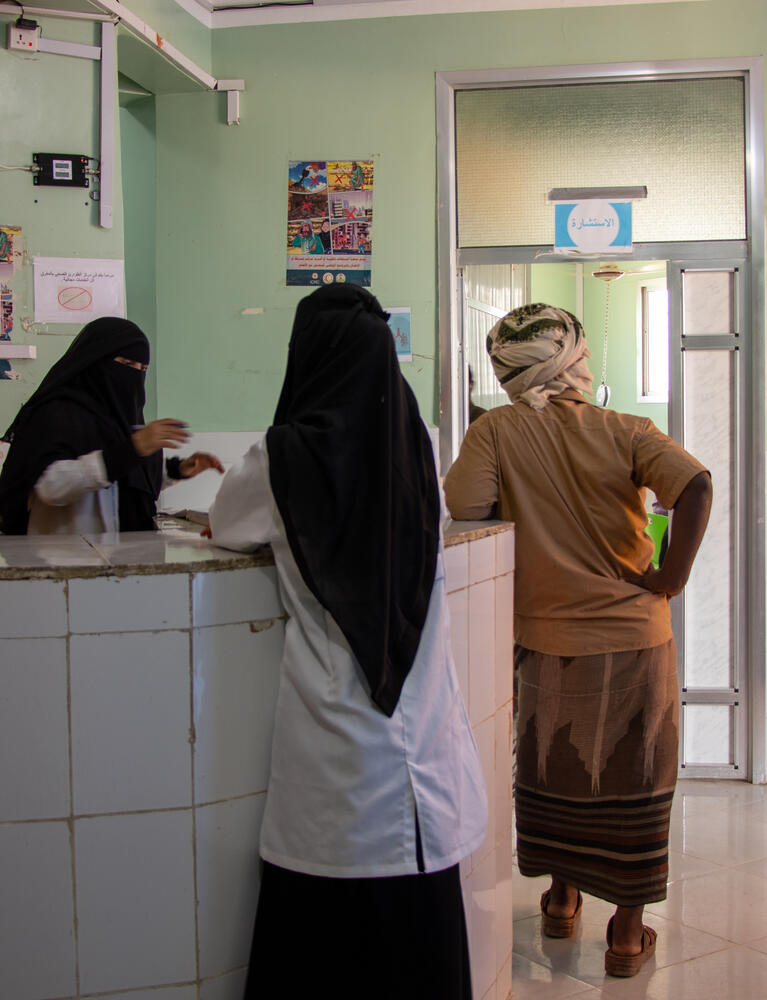Noor, a year and a half old, sits in her mother’s lap while Doctor Hamza checks on her. She’s feeling weak and tired as she’s been suffering from diarrhoea for a few days.
“It breaks my heart every time one of my children gets sick, especially when it’s Noor, my youngest,”, says Jama’a, as she sits in the doctor’s room together with Noor and two of her other children. “It always stresses me when I need to find good quality of healthcare in my area without paying for medical fees”.
Given Jama’a financial situation, the mother of nine has no choice but to come to Mafraq Al Mokha’s health centre to treat her children. Médecins Sans Frontières (MSF) has been supporting this health centre since 2022, with the objective of increasing the primary healthcare capacity in the rural areas of the Mawza district in Yemen.
In addition to the regular medical donations that the team does, MSF supports in the management of the medical emergencies at the emergency room, including the stabilisation of victims of road traffic accidents and the war-wounded before being referred to another facility in Mokha city or elsewhere for additional care. The centre, with the support of MSF teams, also provides regular outpatient consultations, antenatal and postnatal care for women, health promotion activities, paediatric care including nutrition screening and vaccination to respond to the emergence of vaccine-treatable diseases that may be due to the low vacation coverage and availability of vaccines, as well as the hesitation of the community towards vaccines.
Mafraq Al Mokha, located in the Mawza district in the west of Taiz Governorate, is only 30 kilometres from the frontlines. Over the years, it has become a hub for the families that fled the war in Yemen, and is now home to 4500 internally displaced people, living in precarious conditions. Yet, despite this, several international and national organisations have stopped providing support to this town that is now considered one of the most neglected areas in the region, where host and displaced communities find it extremely challenging to access free or affordable healthcare.
“A lot of the cases that we treat at the centre here require referral to another health facility or hospital for additional care due to absence of secondary care here,”, says Doctor Abdulhakim Mohammed Farhan, MSF’s project medical referent support. To respond to this growing need, MSF initiated in 2024 an ambulance referral system, a service that allows patients to be transferred when needed to another hospital free of charge. Given Mafraq Al Mokha’s situation in the mountains, the nearest major hospital is around 40 kilometres away.
“Most of the cases that we refer are either to Mokha’s General Hospital where our teams run a maternity facility and a paediatric ward, or to other health facilities in Taiz governorate”, adds Dr. Abdulhakim. “Many of them suffer from malnutrition or need additional maternal and reproductive care”.
Between January and July this year, more than 1,562 patients were treated in the emergency room of the health centre. During the same period, more than 9,473 patients were treated in the outpatient clinic, with 915 women receiving antenatal and postnatal care. The team also treated patients suffering from communicable diseases, around 488 patients suffering from dengue, and more than 965 patients suffering from malaria, Noor being one of them.
Recently, and following the increase in the number of acute watery diarrhoea and cholera cases that hit Yemen, MSF set up an observation and stabilisation tent in Mafraq Al Mokha with the capacity of two beds. Between April and July, the teams treated 1,089 patients showing symptoms. Some of them were referred to MSF’s cholera treatment centre in Mokha city for additional medical care.
In this little town of Mafraq Al Mokha, this healthcare centre is a beacon of hope for many families. Jama’a, like many other mothers, is grateful for the presence of this centre and the added value it brings to an area that has been largely neglected due to funding cuts and years of ongoing conflict in Yemen.



